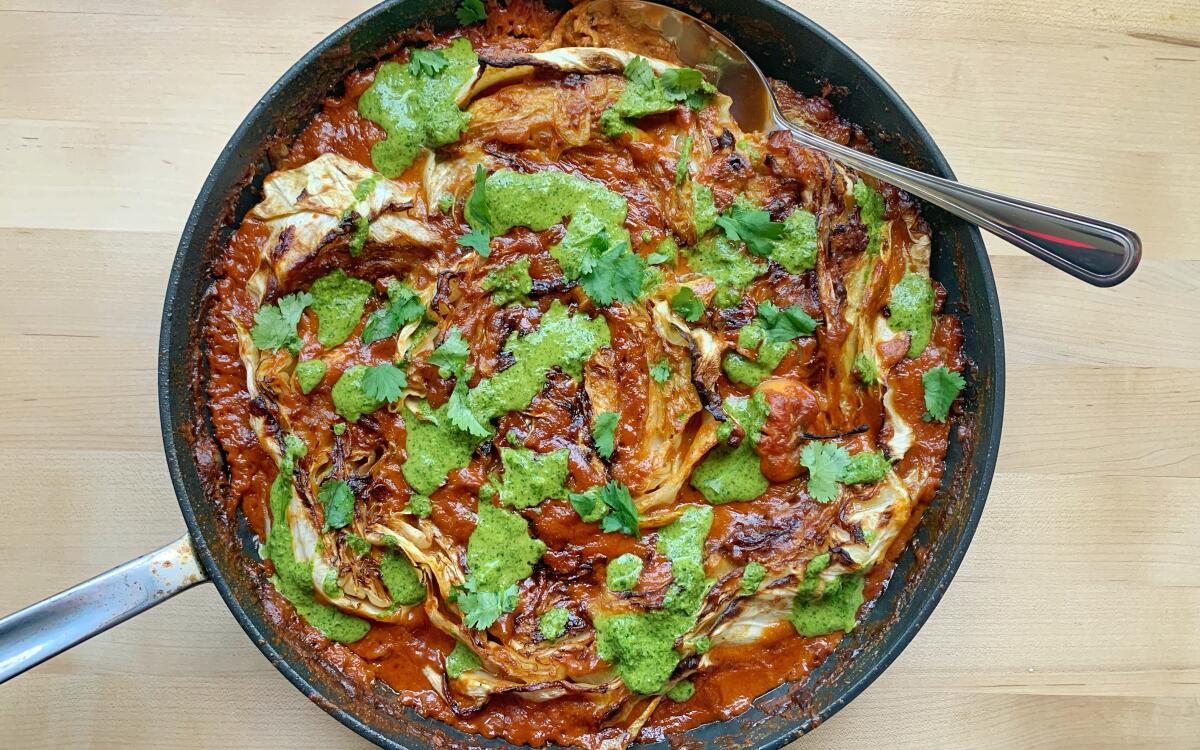Cabbage Mafé With Limey Cilantro Sauce

- Share via
This dish is a riff on Senegalese chicken mafé, using large, satisfying cabbage wedges but no meat. The sauce is made with peanuts that have been freshly ground into butter, but you can use one slightly heaping cup of store-bought, no additive, unsweetened peanut butter as a substitute. Fish sauce is also added to lend an authentic savoriness, but if you’re vegetarian/vegan, you can omit it or use a vegan substitute. Serve this dish with fonio — an ancient grain native to West Africa — if you can find it (it’s available online and at Whole Foods and Erewhon Market, among many locations in L.A.), but I often also serve it with rice. The cilantro sauce is optional, but its acidity cuts through the rich peanut butter sauce nicely, so don’t skip it if you have the time to make it.
First, make the peanut butter: Heat the oven to 350 degrees. Spread the peanuts on a rimmed baking sheet and bake, stirring occasionally, until a shade darker and fragrant, 8 to 12 minutes, depending on the peanuts. Let the peanuts cool for 5 minutes on the baking sheet, then transfer them to a food processor and process until they form a smooth paste. (The nuts will go from being finely ground to a ball of dough and finally to a smooth paste. The process takes 1 to 1 1/2 minutes, so be patient.) If not using the peanut butter right away, transfer it to an airtight container and store in the refrigerator for up to 2 weeks.
Increase the oven temperature to 400 degrees. Heat 2 tablespoons peanut oil in a large skillet over medium-high heat. Season four of the cabbage wedges liberally on each side with salt and pepper, then add to the skillet and cook, flipping once halfway through, until golden brown on each side, 8 minutes total. Using a metal spatula, transfer the cooked wedges to a plate and reserve. Heat 2 tablespoons peanut oil in the skillet and repeat seasoning and cooking the remaining four wedges; transfer to the plate with the other wedges when done. If you have any leaves of cabbage that fall off on the cutting board, roughly chop them and set them aside.
Return the skillet to medium-high heat and heat the remaining 2 tablespoons peanut oil. Add the onions (and any extra chopped cabbage leaves) and cook, stirring occasionally, until beginning to soften, about 4 minutes. Add the ginger and garlic and cook, stirring, until the onions are soft and browned at the edge, about 4 minutes more. Stir in the tomato paste and cook until the paste is lightly caramelized, about 2 minutes more.
Remove the skillet from the heat and stir the peanut butter into the onion mixture, letting it soften from the ambient heat of the skillet. Add the stock, fish sauce, chile quarters and bay leaf. Return the skillet to medium-high heat and bring the sauce to a simmer, stirring gently but steadily until the peanut butter smooths out (trust the process — it will happen). Season the sauce with another large pinch of salt, then arrange the cabbage wedges in the skillet in concentric circles so they all fit; pour any juices that collect on the plate over the cabbage. It will look like too much liquid at first but it will reduce dramatically once cooked.
Place the skillet in the oven and cook until the sauce is reduced and thickened and the tip of a paring knife easily slides in and out of the cores of each cabbage wedge, 40 to 45 minutes. Remove the skillet from the heat and let it rest while you make the cilantro sauce.
Pull off a pinch of cilantro leaves with your fingers and set aside. Roughly chop the remaining cilantro leaves and stems (avoid the final inch or so of tough stems). You should have about 1 1/2 cups chopped cilantro. Place the cilantro in a small blender or mortar and pestle, add the lime juice and oil and season with salt and pepper. Blend until just smooth and taste to adjust seasonings — it should be assertively acidic.
To serve, drizzle half the cilantro sauce over the dish of cabbage and sprinkle with the reserved cilantro leaves. Serve the remaining sauce on the side to drizzle over individual portions.
Get our Cooking newsletter.
Your roundup of inspiring recipes and kitchen tricks.
You may occasionally receive promotional content from the Los Angeles Times.









